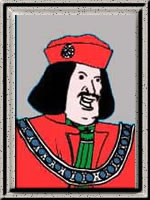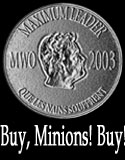Greetings, loyal minions. Your Maximum Leader will point out two articles that he will broadly categorize as being from the world of science. (cue Thomas Dolby…)
The first article is about superbatteries. Apparently a Texas-based start-up has patented an ultracapacitor battery. If the claims of the patent application are borne out in testing and fact, then this could revolutionize just about everything using stored power. Frankly, it could revolutionize items that generate their own power (like cars) and turn them into items that run on stored power.
Some highlights:
An Austin-based startup called EEStor promised “technologies for replacement of electrochemical batteries,” meaning a motorist could plug in a car for five minutes and drive 500 miles roundtrip between Dallas and Houston without gasoline.By contrast, some plug-in hybrids on the horizon would require motorists to charge their cars in a wall outlet overnight and promise only 50 miles of gasoline-free commute. And the popular hybrids on the road today still depend heavily on fossil fuels.
[…]
Skeptics, though, fear the claims stretch the bounds of existing technology to the point of alchemy.
“We’ve been trying to make this type of thing for 20 years and no one has been able to do it,” said Robert Hebner, director of the University of Texas Center for Electromechanics. “Depending on who you believe, they’re at or beyond the limit of what is possible.”
EEStor’s secret ingredient is a material sandwiched between thousands of wafer-thin metal sheets, like a series of foil-and-paper gum wrappers stacked on top of each other. Charged particles stick to the metal sheets and move quickly across EEStor’s proprietary material.
The result is an ultracapacitor, a battery-like device that stores and releases energy quickly.
Batteries rely on chemical reactions to store energy but can take hours to charge and release energy. The simplest capacitors found in computers and radios hold less energy but can charge or discharge instantly. Ultracapacitors take the best of both, stacking capacitors to increase capacity while maintaining the speed of simple capacitors.
[…]
Previous attempts to improve ultracapacitors have focused on improving the metal sheets by increasing the surface area where charges can attach.
EEStor is instead creating better nonconductive material for use between the metal sheets, using a chemical compound called barium titanate. The question is whether the company can mass-produce it.
ZENN Motor [a financial backer of EEStor] pays EEStor for passing milestones in the production process, and chemical researchers say the strength and functionality of this material is the only thing standing between EEStor and the holy grail of energy-storage technology.
Joseph Perry and the other researchers he oversees at Georgia Tech have used the same material to double the amount of energy a capacitor can hold. Perry says EEstor seems to be claiming an improvement of more than 400-fold, yet increasing a capacitor’s retention ability often results in decreased strength of the materials.
“They’re not saying a lot about how they’re making these things,” Perry said. “With these materials (described in the patent), that is a challenging process to carry out in a defect-free fashion.”
Perry is not alone in his doubts. An ultracapacitor industry leader, Maxwell Technologies Inc., has kept a wary eye on EEStor’s claims and offers a laundry list of things that could go wrong.
Among other things, the ultracapacitors described in EEStor’s patent operate at extremely high voltage, 10 times greater than those Maxwell manufactures, and won’t work with regular wall outlets, said Maxwell spokesman Mike Sund. He said capacitors could crack while bouncing down the road, or slowly discharge after a dayslong stint in the airport parking lot, leaving the driver stranded.
Until EEStor produces a final product, Perry said he joins energy professionals and enthusiasts alike in waiting to see if the company can own up to its six-word promise and banish the battery to recycling bins around the world.
These are the types of stories that fill your Maximum Leader with awe at the power of science. He hopes, nay expects, to see real improvement in these technologies in his lifetime. One hopes that the many companies working on ultracapacitors will have a major breakthrough with commerical applications very quickly.
And another item from the realm of “science” is this piece from Nepal. The Nepalese national airline is using unconventional means to “repair” the electrical systems on their Boeing jets.
Officials at Nepal’s state-run airline have sacrificed two goats to appease Akash Bhairab, the Hindu sky god, following technical problems with one of its Boeing 757 aircraft, the carrier said Tuesday.Nepal Airlines, which has two Boeing aircraft, has had to suspend some services in recent weeks due the problem.
The goats were sacrificed in front of the troublesome aircraft Sunday at Nepal’s only international airport in Kathmandu in accordance with Hindu traditions, an official said.
“The snag in the plane has now been fixed and the aircraft has resumed its flights,” said Raju K.C., a senior airline official, without explaining what the problem had been.
Local media last week blamed the company’s woes on an electrical fault. The carrier runs international flights to five cities in Asia.
It is common in Nepal to sacrifice animals like goats and buffaloes to appease different Hindu deities.
For some odd reason your Maximum Leader doesn’t believe that the people at Boeing put this type of fix in the technical manual for the 757. He is interested to see if the efficacy of this approach can be supported by some sort of testing. If so, one would imagine that other airlines would look into animal sacrifice to keep their airline fleets running.
Carry on.


